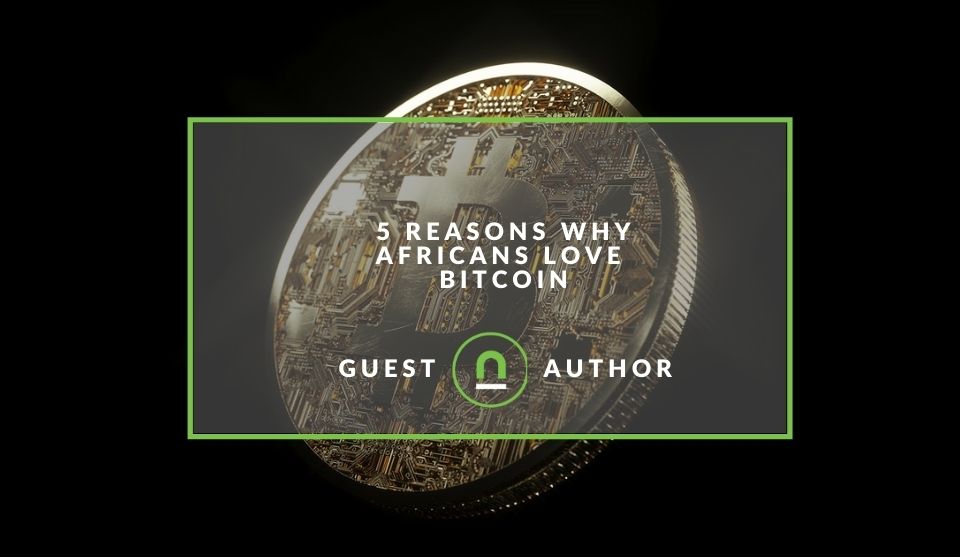Recent posts

Money Talks
XRP vs. Stablecoins: Which Is Better for Cross-Border Payments in 2026?
28 January 2026

Press Releases
Sleep Expert Cautioning Against TikTok’s ‘Mouth Taping’ Trend
28 January 2026

Press Releases
Why Vintage Watches Are the Hottest Trend in 2026
27 January 2026

Press Releases
Africaworks Accelerates The Rollout Of Real Estate Investment Platform
20 January 2026
Popular posts
Extravaganza
Trending Music Hashtags To Get Your Posts Noticed
24 August 2018
Geek Chic
How To Fix iPhone/iPad Only Charging In Certain Positions
05 July 2020
Extravaganza
Trending Wedding Hashtags To Get Your Posts Noticed
18 September 2018
Money Talks
How To Find Coupons & Vouchers Online In South Africa
28 March 2019
5 Reasons Why Africans Love Bitcoin
13 September 2021 | 0 comments | Posted by John Brooks in Money Talks
A cryptocurrency is digital money that users may use the same way they would actual money to purchase items or send money to other users. The term 'cryptocurrency' refers to the intricate cryptography (encrypted codes) utilised to generate and record transactions.
Cryptocurrencies seek to eliminate intermediaries, such as credit card providers or banks, making money transfers between virtual wallets more affordable. Additionally, cryptocurrency is not governed by a central body, which supposedly shields it against government meddling. You can easily convert Bitcoin to naira and interconvert your earnings to the local currency.
Why do Africans love cryptocurrency?
In Africa, cryptocurrency transactions are accelerating. The virtual currency has several benefits for a youthful, tech-savvy populace in a continent where mobile money is already widely used. Africa is witnessing an economic revolution unrelated to banks and with no evidence of outmoded economic policies being reformed.
Monthly bitcoin transactions under $10,000 (€8,500) to and from Africa increased by 55% over the last year, peaking at $316 million in June. These figures, based on data from Chainalysis, a US-based Blockchain research organisation, are anticipated to continue to rise.
And, while Bitcoin is increasingly being used by financial traders in other areas of the world, Africa is breaking the trend by relying on it mainly for commerce. Most of this activity is conducted by individuals and small enterprises in Nigeria, South Africa, and Kenya.
Internal and external remittances
South Africa's remittance industry continues to expand, owing to rural-to-urban mobility and an inflow of migrant labour from neighbouring countries. Bloomberg estimates that the country's remittance industry will reach R34 billion ($2.3 billion) by 2023. Bitcoin is a more cost-effective way to transmit money to relatives living in rural South Africa or adjacent nations.
Literacy in fintech
South Africa continues to be Africa's lone fintech powerhouse. According to data from the United Nations Economic Commission for Africa (UNECA), South Africa is home to 31.2% of the continent's fintech firms. This unusually high level of fintech literacy also applies to the usage of mobile money. Bitcoin is, in many respects, an extension of a payment system that is already well-known and widely used by the South African population.
South Africa likewise deviates from the norm in Sub-Saharan Africa in terms of the unbanked population. While more than half of Sub-Saharan Africa's population is unbanked, more than 80% of South Africa's population is banked.
Absence of strict regulations
Finally, South Africa has not yet enacted stringent cryptocurrency regulations that may limit interest in bitcoin. Apart from tax and AML/KYC laws, the country's crypto sector is primarily unregulated.
Consistent currency devaluation
African currencies like the South African Rand and The Nigerian naira have consistently devalued throughout the years. As a result, Africans are looking for a more secure means of storing assets. And this is one of the solutions provided by bitcoin. Nigerians may keep their cash safe in their wallets with Bitcoin. They are unconcerned about the naira's depreciation, especially given that the value of bitcoin looks to be continually increasing.
Additionally, they are not required to sell their naira at unfavourable exchange rates in exchange for US Dollars, Euros, or Japanese Yen, among other currencies. Additionally, because the government does not control bitcoin, bitcoin owners are safe from any naira volatility.
Cross-border payments are made efficiently.
Another reason for Bitcoin's continued appeal in Africa is its more efficient cross-border payment method. For instance, if Nigerian wishes to pay a merchant in China, the local bank processes are cumbersome, and payment to the merchant may take 3-5 days. However, the same transaction may be performed in a couple of minutes using bitcoin. As a result, individuals choose to utilise bitcoin to fund cross-border transactions. It is both speedier and less expensive.
What accounts for Bitcoin's popularity in South Africa?
Bitcoin enables South Africans to overcome several monetary challenges they encounter daily. Here are only a handful of these issues:
Devaluation of the currency
Currency devaluation is a significant issue in many nations worldwide, including South Africa. The South African rand has lost over 60% of its value against the dollar in several years! In simple words, this indicates that the currency we have has a lower purchasing power.
Inflation/Hyperinflation
Bitcoin's supply is limited to 21 million coins. As a result of this unique characteristic, Bitcoin is immune to inflation and hyperinflation. The South African Rand has yearly inflation of nearly 5%, while Bitcoin experiences annual inflation of 1.82%, which will continue to decline over time.
Invest in the unbanked
Over 11 million South Africans lack access to banking services. By utilising Bitcoin, we can enable all of these individuals to participate in the economy. Bitcoin is completely free to use; all you need is a simple gadget and access to the internet.
Additionally, Bitcoin enables users to transmit money instantaneously and inexpensively to anyone, anywhere in the globe. This would allow many African individuals to transfer money effortlessly to family members who live in another region or nation.
Conclusion
While Bitcoin resolves all these issues, it is nevertheless purchased by individuals as a speculative investment. Many predict that Bitcoin's price will continue to rise over time precisely as it has done in the past.
Tell us your story
Would you like to write for nichemarket just like John has? Find out how to submit a guest post and when you're ready, you can contact us.
Contact us
If you would like to know more about digital assets or would like to market your digital asset company or how to set it up for your business, then don’t be shy we’re happy to assist. Simply contact us
Are you looking to promote your business?
South African finance business owners can create your free business listing on nichemarket. The more information you provide about your business, the easier it will be for your customers to find you online. Registering with nichemarket is easy; all you will need to do is head over to our sign up form and follow the instructions.
If you require a more detailed guide on how to create your profile or your listing, then we highly recommend you check out the following articles.
Recommended reading
If you enjoyed this post and have a little extra time to dive deeper down the rabbit hole, why not check out the following posts on cryptocurrency and blockchain.
- Why Blockchain and Cryptocurrency Is The Future Of Money
- 24 Ways To Earn Cryptocurrency
- How To Pay Tax On Cryptocurrency In South Africa
- How To Buy Bitcoin In South Africa
- Why Does Your Bitcoin Wallet Address Keep Changing?
- How To Make A Private Bitcoin Transaction
- The Most Used Cryptocurrencies in South Africa
Disclaimer: This article should not be taken as, and is not intended to provide any investment advice and is for educational purposes only. As of the time posting the writers may or may not have holdings in some of the coins or tokens they cover. Please conduct your own thorough research before investing in any cryptocurrency as all investments contain risk.
Tags: Bitcoin, Africa, Guest Post
You might also like
Sleep Expert Cautioning Against TikTok’s ‘Mouth Taping’ Trend
28 January 2026
Posted by Steph M in Press Releases
Sleep expert warns that the viral mouth taping trend flooding TikTok could pose serious risks for people with undiagnosed sleep apnea and other sleep...
Read moreThe South African Industrial Tech Revolution
05 January 2026
Posted by Stephen Johnson in Ace of Trades
Explore how cutting-edge software and technology are driving the South African industrial tech revolution, optimising operations and boosting global ...
Read more{{comment.sUserName}}
{{comment.iDayLastEdit}} day ago
{{comment.iDayLastEdit}} days ago
 {{blogcategory.sCategoryName}}
{{blogcategory.sCategoryName}}

